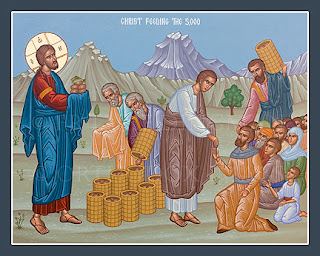All I ask is that you make sure your kids are safe. Have fun and enjoy being a kid with your kids for one night. Dress up funny and go out and knock on your neighbours doors.
31 October ~ Our righteous father John Kochurov, hieromartyr of the Soviet revolution
John Kochurov was born on July 13, 1871. His father was a priest. His education included attendance at the Ryazan Seminary before continuing at the St. Petersburg Theological Academy. He excelled at his studies at both the seminary and academy. After graduating in 1895, Fr. John married and then entered his life’s work when he was ordained deacon. On August 27, 1895, he was ordained a priest at the St. Alexander Nevsky Lavra in St. Petersburg by Bishop Nicholas (Ziorov) of the Diocese of the Aleutians and Alaska.
Fr, John returned to Russia in 1907 where he was assigned to Narva, Estonia. Here he put to use the skills he had learned in the United States teaching catechism in the schools. Then in 1916, he was transferred to St. Catherine’s Cathedral in Tsarskoe Selo, just outside St. Petersburg. At St. Catherine’s, he established himself as a popular priest who was skilled in presenting moving sermons. Then in October 1917 the Bolshevik upraising in St. Petersburg spilled over quickly into Tsarskoe Selo as the town was attacked by Bolshevik elements. The people thronged to the churches where the clergy held prayer services and led processions throughout the town praying for peace.
Turkey Shoot
So here is the way it works. We have a big wheel, a new wheel this year, thanks to Nicky and Sue. The wheel has 90 numbers on it. So we sell 90 tickets at $.50 each. Then with every one whooping and hollering we spin the wheel and the lucky person wins a turkey! Not bad for $.50 I would say. So we gave away 26 turkeys, 3 fruit baskets, 1 50/50, and a large box of food worth about $100. There is also a door prize. You write your name on the back of your loosing tickets and throw them in a bag and one is drawn out and BINGO you win a turkey. The best part of the night is that the folks from the church, who always seem to win multiple turkeys, give them to people who did not win one. A very Christian thing to do! I am so proud of my parishioners!
This event is great and brings people from the community to our church. Anything that brings people to the church is worth doing I say regardless of how much money is raised. We need to raise money yes, but the people we invite into our house always have a good time, and that is very important.
So I need to say thanks to Jim D and his great kitchen crew for the meal, and to Tom D and his crew for running the turkey shoot. I would name you all but I would leave someone out and you all know who you are. You guys are what makes St. Michael a great community. I do not say it enough but you guys are the greatest! Thanks also to all of you who came, without you we would just be standing around all night… LOL
Stay tuned for the Annual Ham Shoot in the Spring.
27 October ~ Dimitrie the New, Protector of Bucharest
How do we wish to be remembered?
 |
| Jesus feeding the 5,000 |
Recipe Wednesday ~ Cape Breton Buttermilk Biscuits
5 c. flour
6 tsp. baking powder
1/4 to 1/2 tsp. soda
3 c. buttermilk
1 tsp salt
1/4 c. white sugar
3/4 c. lard (butter works but does not have the same taste)
Mix dry ingredients, cut in lard. Mix. Add buttermilk and mix thoroughly. Press and knead mixture with hands until you have soft dough. Cut with biscuit cutter and bake in a preheated 450 over for 20 to 35 minutes.
Recipe comes from The Scottish Family Cookbook published by the St. Andrew’s Society of New Hampshire and the New Hampshire Gathering of the Scottish Clans.
Lest We Forget
The New Colossus
Not like the brazen giant of Greek fame,
With conquering limbs astride from land to land;
Here at our sea-washed, sunset gates shall stand
A mighty woman with a torch, whose flame
Is the imprisoned lightning, and her name
Mother of Exiles. From her beacon-hand
Glows world-wide welcome; her mild eyes command
The air-bridged harbor that twin cities frame.
“Keep ancient lands, your storied pomp!” cries she
With silent lips. “Give me your tired, your poor,
Your huddled masses yearning to breathe free,
The wretched refuse of your teeming shore.
Send these, the homeless, tempest-tost to me,
I lift my lamp beside the golden door!”
Washburn House in Worcester to begin a new life
 |
| Washburn Houe Worcester |
Don’t ask, don’t tell the chaplains
The setting: The office of a priest who serves as a military chaplain.




